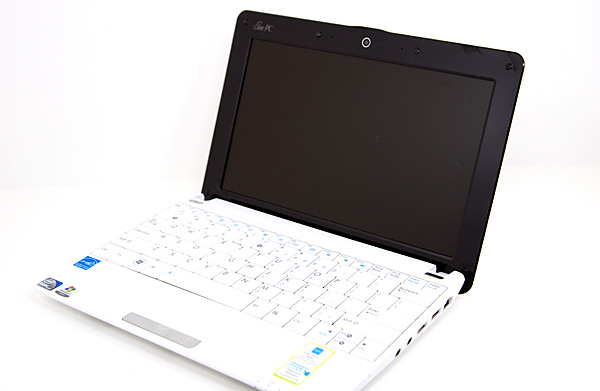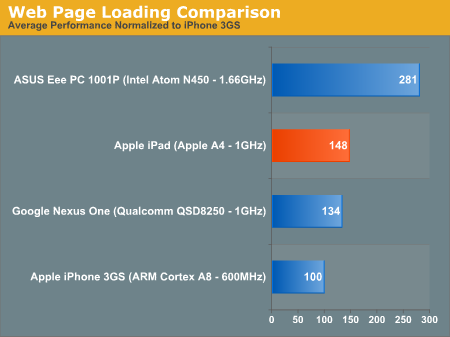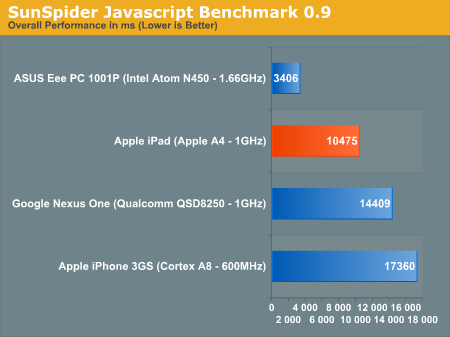Apple's iPad - The AnandTech Review
by Anand Lal Shimpi, Brian Klug & Vivek Gowri on April 7, 2010 9:39 PM EST- Posted in
- Smartphones
- Mac
- Apple
- iPad
- Mobile
The iPad and its Performance
Apple knows how to make things feel fast. It’s all about making animations as smooth as possible and making sure that the UI always responds consistently. Apple isn’t perfect in this regard, but it does pay more attention to detail here than most other companies.
On the iPhone, scrolling is always smooth, swiping between home pages feels quick, apps launching are always well animated. The same is (mostly) true for the iPad, but thanks to a faster processor, many of these animations are physically faster. Bringing up the home screen is lightning quick, as is swiping between them. Scrolling is also very smooth, so much in fact that I found myself scrolling through emails and pages just because the animation was done very well.
There are some rough edges of course. While swiping between home screens is nice and fast, bringing up the quick search screen is choppy (not Android choppy, but choppy for the iPhone OS). The same is true for some other apps, particularly 3rd party ones. The latter point makes sense given that developers haven’t had much time with the device, but Apple not ensuring a perfectly smooth UI across the entire OS is telling.
Apple tends to move engineering resources around the company. The iPhone launch delayed the OS X launch that same year. And the iPad launch surely had some impact on other products. Or is it the other way around? Later this week we’ll see Apple preview version 4 of the iPhone OS, which implies a release sometime in the coming months (June?). An on-track iPhone OS 4 release could explain some rough edges with the shipping iPad, as well as why we don’t seem to have a plethora of amazing apps from Apple at launch.
Despite my nitpicking, this thing is definitely faster than the iPhone 3GS and even the Google Nexus One. Surfing the web, loading applications or generally just interacting with the device. Going to a 3GS from a Nexus One feels slow, going to a 3GS after using the iPad just feels wrong.
But with a larger screen you get the desire to want to do more and expect more from the iPad. I would say that in this sense the performance is a letdown. The A4 is speedy but not quite fast enough for this size of device.
| iPad (Apple A4) | Google Nexus One (Qualcomm QSD8250) | iPhone 3GS (ARM Cortex A8) | iPhone 3G (ARM11) | |
| Manufacturing Process | 45nm | 65nm | 65nm | 90nm |
| Architecture | In-Order | In-Order | In-Order | In-Order |
| Issue Width | 2-issue | 2-issue | 2-issue | 1-issue |
| Pipeline Depth | ??-stage | ??-stage | 13-stage | 8-stage |
| Clock Speed | 1GHz | 1GHz | 600MHz | 412MHz |
| L1 Cache Size | ?? | ?? | 32KB I-Cache + 32KB D-Cache | 16KB I-Cache + 16KB D-Cache |
| L2 Cache Size | ?? | ?? | 256KB | N/A |
| GPU | PowerVR SGX | Adreno 200 | PowerVR SGX | PowerVR MBX |
To figure out where the iPad falls in the grand scheme of things I ran a number of web page load tests and browser benchmarks. To remove the internet from the equation, I loaded all pages off of a server on my own network. This is as close to a pure CPU and OS/browser benchmark as we’ll get.
Given that the iPad runs off smartphone hardware, the obvious comparisons are the iPhone 3GS and Google’s Nexus One. The former is based on a 600MHz Cortex A8, while the latter uses Qualcomm’s 1GHz Snapdragon QSD8250 running Android. Oh and there’s just one more thing:

This is ASUS' Eee PC 1001P. Priced below $300 it is the epitome of the netbook. Low cost and functional, but without looking overly cheap. Based on Intel’s Atom N450 processor this should put things in perspective. I ran the same set of benchmarks on it that I ran on the rest of the platforms. I used Chrome running on Windows 7.
| Apple iPhone 3GS | Google Nexus One | Apple iPad | ASUS Eee PC 1001P | |
| AnandTech Front Page | 4.5s | 4.3s | 3.1s | 1.2s |
| CNN Front Page | 5.4s | 4.4s | 3.9s | 2.8s |
| CNN Front Page 3 | 8.7s | 6.8s | 6.3s | 3.5s |
| 2.5s | 2.4s | 2.0s | 1.4s | |
| MSN | 10.5s | 5.1s | 5.0s | 2.8s |
| Yahoo! | 1.9s | 1.6s | 1.4s | 0.8s |
| Engadget | 15.0s | 11.6s | 11.1s | 4.8s |
To make this data easier to read I averaged all of the numbers for each device, normalized them to the iPhone 3GS (in terms of % faster) and put the data in a graph:

And now you see why I said the A4 does well against smartphones, but doesn’t cut it for the screen size of the iPad. While the iPad is 46% faster than the iPhone 3GS and 14% faster than the Nexus One on average, the Eee PC is 87% faster than the iPad. It is noticeable!
Real world JavaScript performance is also no contest between the A4 and Intel's Atom:

If Apple doesn't have plans to use Moorestown (or a derivitive) in its iPad at some point, I would be sorely disappointed in the company's ability to make intelligent hardware decisions.
I will give Apple credit, the iPad feels quick in most cases, which is probably why the sacrifice to go with a lowly Cortex A8 was made. However, when it comes to browsing the web, there’s a tradeoff. It’s much better reading web pages on the iPad, but it’s much faster on the Eee PC.
The comparison gets more complex when you look at things like application launch times. It takes the iPad 3 seconds to launch Pages, and less than 1 to launch Safari. If the application was previously in memory, the Eee PC can fire up Chrome in less than a second, otherwise it takes longer depending on what Windows decides to do with the disk at that moment. And launching Word from scratch takes much longer than 3 seconds.
Apple is relying on solid state storage and a very lightweight OS while netbooks usually have terribly slow hard drives and a bulky software stack. It’s a ginormous tradeoff. Web pages load quicker on a netbook, but are easier to read/navigate on the iPad.
What Apple absolutely needs in here is an Atom CPU. Apple buys itself a lot of leeway by using a very lightweight OS, but when a web page still takes a dozen seconds to load - you feel the pain. While I realize that Atom hasn't been suited for such an application until now, there's no reason Apple should've picked the A4 over Moorestown. Moorestown can fit in devices far smaller than the iPad, and would make this thing perform more like (and better than in some cases thanks to the OS) a netbook. I laughed when Jobs said that netbooks don't do anything well. While I'd agree a lot of the time, here they do seem to load web pages faster than the iPad.










108 Comments
View All Comments
solipsism - Thursday, April 8, 2010 - link
I also thought the Moorestown recommendation was odd, especially when the next page was about the phenomenal battery life. If he made a more detailed case for it perhaps he'd have a point, but the simple "because it's faster" stance is lacking.Anand Lal Shimpi - Thursday, April 8, 2010 - link
Initial power specs for Moorestown appear to be fairly competitive with ARM based SoCs. Remember this is Moorestown, and not Pineview. The two chips are very different.Realistically I don't think it would be Moorestown, but the 32nm follow-on starts to make a lot of sense.
Take care,
Anand
metafor - Thursday, April 8, 2010 - link
Just curious, what are the initial power numbers for Moorestown anyway? Keep in mind that with the change in bus architecture and the use of LP DRAM, performance will be significantly slower in some cases than current netbooks. Also, would it really compare to an A9-class SoC?IntelUser2000 - Friday, April 9, 2010 - link
I have a feeling Apple didn't go Moorestown for two primary reasons.1) Timeframe
2) Cost
Moorestown should be announced shortly, but the devices based on it won't be available until Q3 of this year. That's 6+ months from when the iPad is going to release. And although Intel might achieve both better performance and comparable power usage, but the sacrifice there will be higher cost. Fully integrated SoC like the A4 costs significantly less.
Performance should be quite good. There's a 600MHz version for smartphones that can use Burst Mode to 1.2GHz, and a MID oriented version that probably clocks at 1.3GHz base and does 1.9GHz burst. It's supposed to feature "Bus Turbo" as well.
If they also do a full integrated memory controller unlike Pineview we have a good chance it'll be clock per clock faster than Netbook Atoms. Earlier on Intel claimed "30%" boost over previous platform but clock speeds weren't mentioned.
metafor - Friday, April 9, 2010 - link
Moorestown will be a fully interated SoC. It'll have LP DDR1 and LP DDR2 memory controllers as well as a GPU, the Atom CPU and various peripheral connectivity. It's comparable to the A4 in terms of features although I really would not write it off as "comparable" in terms of power until some data is published.ekul - Thursday, April 8, 2010 - link
I'd agree the successor to moorestown is more promising. Are there even any shipping products based on moorestown yet? I don't think apple is going to take a gamble on an untested platform.I'm genuinely looking forward to seeing performance numbers for cortex a9, especially since there will be real dual core mobile variants, not just hyperthreading. A technique like what MS is planning for IE9, rendering a website on one core and compiling javascript on another, would help bridge the perormance gap along with the higher clocks.
michal1980 - Wednesday, April 7, 2010 - link
really this is easier then a laptop/notebook?A notebook by its vary nature I can rest on my lap or a table and adjust its screen. To watch a movie I dont have to hold the thing up.
To type, I dont have to bend to werid angles to hold the device up, etc etc.
IMHO, it seems like alot of the experance is attributed to the newness of the device vs its actual usage. I'm wonder how this newness will wear.
manicfreak - Thursday, April 8, 2010 - link
Can't you do all of those aforementioned things on an ipod touch/iphone? There are already home automation apps for the iphone right now.What can the iPad do that the iphone/ipod touch can't? Beside having a bigger screen and longer battery life?
And for such a big device, the performance should be closer to an atom instead of a snapdragon.
If something doesn't fit in my pocket, then I would rather bring a light-weight CULV laptop with me... with touchscreen if one wishes (i.e. Acer Timeline 1820T) or a hybrid notebook-tablet (Lenovo IdeaPad U1).
jasperjones - Thursday, April 8, 2010 - link
"there are some things the iPad does much better than anything you might own today. Web browsing, photo viewing, reading email, any passive usage scenarios where you're primarily clicking on things and getting feedback, the iPad excels at."What exactly makes it better at those tasks? It's not that I disagree but, in my opinion, you didn't drive this point home. I don't understand why you think it's better. And yes, I read the whole article.
solipsism - Thursday, April 8, 2010 - link
I don't think anything anyone can write can convince you. Many aspects just feel more natural to use. That isn't to say it's perfect everywhere but I think that as a casual mobile consumption device it's much better than a notebook, and much better than a netbook.